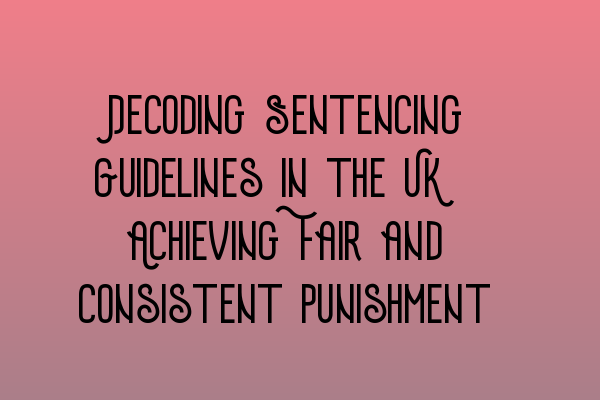Decoding Sentencing Guidelines in the UK: Achieving Fair and Consistent Punishment
When it comes to criminal law in the UK, the sentencing guidelines play a crucial role in ensuring fair and consistent punishment for offenders. Understanding these guidelines is essential for both legal professionals and the general public to have confidence in the justice system. In this article, we will decode the sentencing guidelines in the UK and explore the factors that influence sentencing decisions.
The Importance of Sentencing Guidelines
Sentencing guidelines provide a framework for judges and magistrates to determine appropriate punishments for specific offences. These guidelines ensure that similar offences receive similar punishments, promoting consistency and transparency in the criminal justice system. By following these guidelines, the courts aim to achieve fairness and proportionality in sentencing.
However, it’s important to note that sentencing guidelines are not fixed rules. They provide a range of sentencing options based on the seriousness of the offence and the circumstances of the offender. Judges have the discretion to deviate from the guidelines if there are exceptional circumstances that warrant it.
Understanding the Sentencing Process
The process of sentencing involves several stages. Initially, the court considers the seriousness of the offence, taking into account factors such as the harm caused, the level of premeditation, and the offender’s culpability. This assessment helps determine the starting point for sentencing.
Next, the court considers any aggravating or mitigating factors. Aggravating factors, such as previous convictions or the use of violence, may increase the severity of the sentence. Conversely, mitigating factors, like genuine remorse or a previously good character, may lead to a more lenient sentence. The court carefully balances these factors to reach a fair and proportionate sentence.
The Role of Sentencing Guidelines
The Sentencing Council in the UK issues guidelines for various offences, ranging from assault to drug-related crimes. These guidelines outline the factors that should be considered when determining the appropriate sentence. Legal professionals, such as solicitors and barristers, rely on these guidelines to advise their clients and present the best possible case in court.
For example, if you are facing charges related to drug possession, it’s crucial to understand the relevant sentencing guidelines. By familiarizing yourself with the guidelines, you can assess the potential outcomes of your case and make informed decisions with your legal representation.
SQE 1 Practice Exam Questions and SQE 1 Practice Mocks FLK1 FLK2 articles provide valuable resources for SQE 1 candidates looking to enhance their knowledge and prepare for the exam.
When exploring SQE 2 Preparation Courses and SQE 1 Preparation Courses, it’s essential to understand the impact of sentencing guidelines on criminal law. These courses equip aspiring solicitors with the necessary knowledge and skills to navigate the complexities of the legal profession, including understanding and applying sentencing guidelines correctly.
Stay up to date with the latest SRA SQE Exam Dates to ensure you don’t miss any important deadlines.
Conclusion
Sentencing guidelines are an essential tool in achieving fair and consistent punishment in the UK criminal justice system. By understanding the factors considered during sentencing and familiarizing oneself with the relevant guidelines, legal professionals and defendants can navigate the complexities of the process effectively. Through this, we can maintain public confidence in our justice system.
